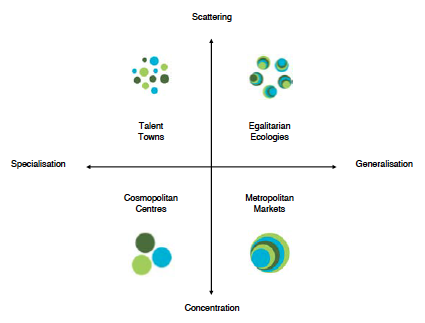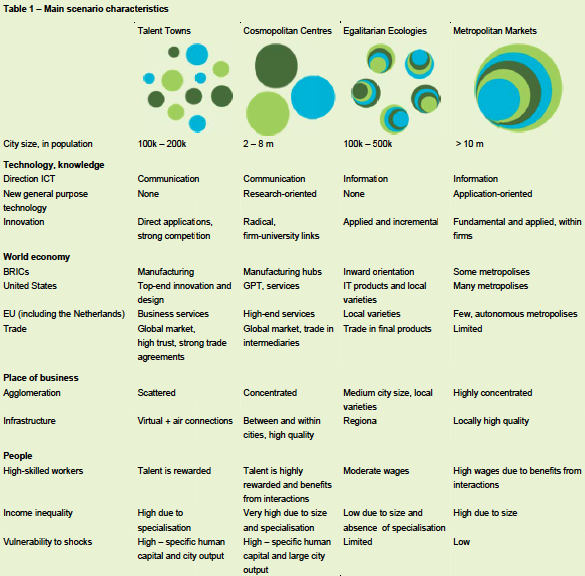In this scenario study, we sketch the most important challenges for the Netherlands to remain an attractive place for business with high-quality production and a flexible labour market. The scenarios offer students, employees, companies and government guidance in preparing for the future. By definition, the future is uncertain and becomes more uncertain the further we look ahead. The scenarios for 2040 sketch four possible worlds based on two fundamental uncertainties: the size of cities and the division of labour in the workforce.
Scenarios for 2040
Sketching future worlds contains a strong element of storytelling, which is essential when investigating the future. Our stories are developed using anticipatory thinking where the aim is to develop a rich and detailed portrait of a plausible future world, including the challenges and opportunities that such an environment would present.
Scenarios provide a useful tool in a world that is uncertain and unpredictable. They reveal different possible futures that are plausible and challenging.
For a shorter horizon, quantifying the future might be feasible and meaningful. For a period of thirty years, we believe that quantifying the future becomes less important whereas developing scenarios about possible future images of the world gains weight. Forecasting future income growth is gradually replaced by presenting consistent and plausible pictures for future worlds.
Our work sketches the most important trends, the uncertainties around these trends, and stories about the functioning and non-functioning of the economy in the coming decades. We point to the trade-offs policymakers face when trying to solve problems arising from market failures. We show how policymakers today may prepare for developments in the future.
The Economy in 2040
How will we earn our money in 2040? Policymakers are confronted with such questions. Decisions have to be made today based on current knowledge and cannot be made conditional on future events. For policies that can be changed rapidly, it is feasible to take action immediately and adjust the policy when it turns out to be the wrong one or when more knowledge about outcomes becomes available. It becomes another matter when policies have a long lead-time or when they involve investments with potentially large sunk costs. In such circumstances, policymakers have to trade off the benefits of waiting against the costs of delay. For instance, young people across Europe are paying the price for policymakers misjudging the trade-offs involved in labour market developments.
Scenarios Help (Re)Consider Options
To provide an answer to the question of how we will make a living in 2040, scenarios help policymakers to consider and reconsider different options. Scenarios bundle historical developments, current stylised facts and trends into consistent stories for alternative futures. We have developed four scenarios to analyse how the Dutch economy may evolve. In building the scenarios, we split the question of how we will make a living into the questions of who earns the money and where the money is earned in 2040. People are considered in their role as workers while cities are viewed according to the type of production that occurs there and the connections that exist within and between them.
How do firms divide tasks among workers, and what will be the main characteristics of the workforce in 2040? What determines the size and structure of cities in 2040? The answer to both questions depends on the development of technology – the fundamental driver of future economic development.
Technology Drives the World
Information communication technology (ICT) changes the division of tasks among workers through two main channels: communication and information. The communication technology (CT) part of ICT facilitates transmission of ideas and information and enables people to quickly check and confirm their validity. Tasks that used to be highly integrated can now be disconnected and executed by different persons in different places. Workers specialise. The information technology (IT) part of ICT improves the way workers process information. Many routine tasks have been taken over by computers and expert systems. Systems that link up with each other process larger and more complex types of information. This broadens the scope of work processes. Workers generalise and become a jack-of-all-trades.
Will a new general purpose technology arrive over the next 30 years? How that question is answered implies certain shifts in city sizes in the scenarios. In its early phases, the development of a general purpose technology strongly depends on face-to-face contacts. Researchers, innovators, designers and managers all benefit from close personal interaction in order to exchange knowledge. This initiates a shift towards larger cities. On the other hand, if there is no new general purpose technology, ICT will lead to scattering of economic activity across space. This will create smaller and well-connected cities. Since the future arrival of a new general purpose technology represents a major uncertainty, cities may either shrink or expand over the coming 30 years.
Scenario Framework: From Specialisation to Generalisation
The horizontal axis in Figure 1 presents the options for the division of tasks; the vertical axis shows the possibilities for city size. The scenarios are labelled such that the first term reflects the characterisation of people and the second informs about the type of location. For example, the scenario in which workers specialise and city size is relatively small is labelled Talent Towns.

Figure 1. Four scenarios
In this scenario, the economy is moving towards a task economy in which workers perform one or many tasks rather than producing one or only a few products. This implies a new division of work. There are two possible directions.
- First, workers specialise and excel in one or a few tasks. The cost of coordinating tasks determines how specialised firms and cities become. Examples of specialised cities are Detroit, which has specialised in producing cars.
- Second, workers are a jack-of-all-trades and mainly produce for the local market. The generalist worker is employed easily in many occupations. He uses inputs from the world’s knowledge stock and imports intermediate goods. Once again, the generalisation of work extends to firms and cities. Examples of generalised cities are New York, London and Amsterdam.
The uncertainty about cities is not about cities becoming more important since this is true in all scenarios. The question is one of size: will they be large or small. The first possibility is that cities become relatively small and are scattered across space. They serve as small economic and urban spikes. In this world, there are few reasons for economic activity to cluster. A second option has economic activity becoming highly concentrated in a limited number of large cities. Cities are the meeting places of people for the purpose of trade, the exchange of ideas, and the development of new technologies, but also to optimise the match between workers and firms and between producers and consumers.
Table 1 presents the most salient characteristics of each of the four scenarios. The table shows the implications of the scenarios for the size of the city, representing limited agglomeration benefits in Talent Towns and huge benefits in Metropolitan Markets. The scenarios are not only relevant to the Netherlands but also to the rest of the world.

Strategic Policy Making
The scenarios offer guidance for long-term strategic policymaking. Technology determines the allocation of future production, which limits the scope for the government to intervene. The scenarios reveal that uncertainties in future production mainly involve uncertainty about the division of labour and about its distribution across space. This sheds light on today’s choices. For instance, investments in infrastructure should not only solve today’s traffic jams but should also take some account of possible future growth (or decline) of cities and the connections within and between cities. Public institutions for education, science and innovation have to look beyond today’s questions and consider the possibility that specialisation may become crucial. Finally, labour market institutions, although designed in the past, should anticipate future problems as well.
Regardless of how the future unfolds, it is necessary for cities to be able to develop more freely. Cities need more possibilities to pursue their own policies. In most areas good policy varies by scenario:
- Strengthen cities and infrastructure. Large cities should be able to grow, with a local network of public transportation and roads, combined with excellent knowledge institutions. Small cities require excellent connections in the form of highways and ICT networks.
- Education in worlds with specialised knowledge asks for early selection and excellence. Generic knowledge puts more emphasis on accessibility and broad basic training.
- Targeted innovation policies are only effective in the scenario with specialised and large cities.
- The role of the welfare state is limited in all scenarios. Opportunities are especially scarce in scenarios with much specialisation and much need for collective protection of vulnerable employees. The least protection is required in scenarios with an emphasis on generic knowledge in which the government at the same time is most capable of providing such protection.
- Renting a home is preferable to buying one in scenarios that emphasise specialisation. Workers renting a home are able to respond more flexibly and prevent a large drop in wealth when their specialisation becomes obsolete because of economic circumstances, as happened in the past in the textile industry in Tilburg and Enschede. Buying a home better suits scenarios with a broadly educated workforce.
- Specialised workers benefit from policies that stimulate retraining.
| Authors: | Bas ter Weel b.ter.weel@cpb.nl
George Gelauff g.m.m.gelauff@cpb.nl Albert van der Horst a.van.der.horst@cpb.nl |
|||||||
| Sponsors: | N/A | |||||||
| Type: | National foresight exercise covering a single issue | |||||||
| Organizer: | CPB, Netherlands Bureau for Economic Policy Analysis; www.cpb.nl | |||||||
| Duration: | 2008-2011 | Budget: | N/A | Time Horizon: | 2040 | Date of Brief: | Feb 2012 | |
Download EFP Brief No. 210_Netherlands of 2040
References
http://www.nl2040.nl/index-en.htm
http://www.cpb.nl/en/publication/strengthen-cities-prepare-netherlands-future